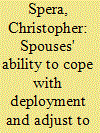| Srl | Item |
| 1 |
ID:
141171


|
|
|
|
|
| Summary/Abstract |
This study examined whether satisfaction with the Air Force (AF) as way of life increased post-9/11 and whether it has sustained. Using data from 179,309 personnel collected across a period of eight years (2000–2008) in four waves of cross-sectional data collection, we found that satisfaction with the AF as a way of life increased dramatically following 9/11 and since then has declined from the height, but has not returned to pre-9/11 levels. After controlling for time as well as demographics, the best predictors of satisfaction were (1) feeling that the AF is a good environment for bringing up children, (2) a strong a sense of community, and (3) perceived strong unit leader support for members and their families.
|
|
|
|
|
|
|
|
|
|
|
|
|
|
|
|
| 2 |
ID:
085368


|
|
|
|
|
| Publication |
2009.
|
| Summary/Abstract |
Using data from 34,381 Air Force active-duty members, the current study examines active-duty members' perceptions of their spouse's or significant other's ability to cope with deployment of unknown length and adjust to demands of being an Air Force family. Active-duty members' perception of their spouse's ability to cope with deployment significantly varied by rank and time married, with 35 percent of junior enlisted and 30 percent of members married less than three years indicating their spouse would have a serious or very serious problem coping with deployment of unknown length. Protective factors-unit relationship quality, leadership effectiveness, and tangible social support from community members-were positively and significantly related to members' reports of spousal ability to adjust to Air Force family demands. The variance explained by these protective factors was highest for active-duty members who had been away from home for deployment or temporary duty for more than six months in the past twelve months.
|
|
|
|
|
|
|
|
|
|
|
|
|
|
|
|